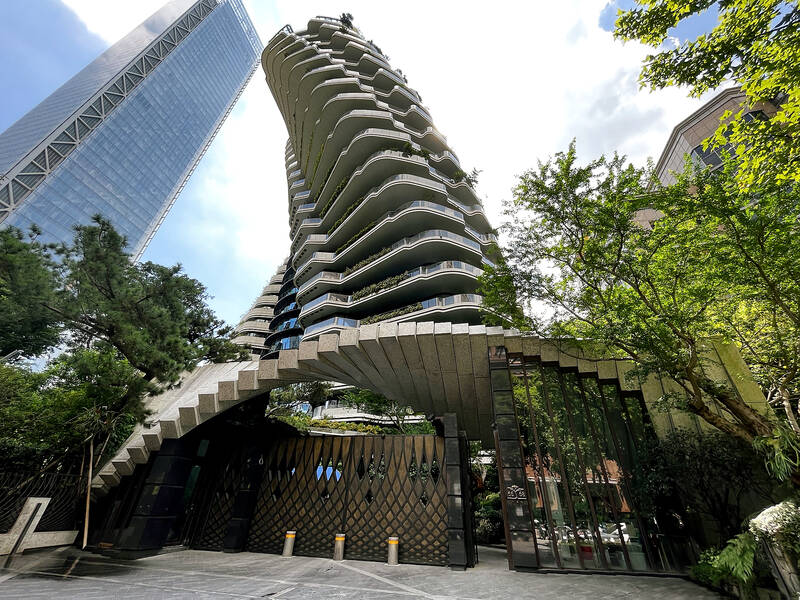Presale and newly completed house prices last quarter picked up 18.1 percent on average in northern Taiwan, but the uptrend might come to an end next year if sales continue to stall, property researcher My Housing Monthly said in a report.
“This segment of the property market has seen a tumultuous year, but has held firm so far, despite unfavorable twists sprouting almost every month,” the Chinese-language publication’s research chief Ho Shih-chang (何世昌) said, referring to interest rate hikes, punitive taxes on short-term property trading, selective credit controls and bans on preorder transfers.
Building material price hikes, labor shortages and a lack of selling pressure have prompted developers to adopt a bold pricing strategy, but a turnabout might be inevitable if sales rates disappoint for an extended period, Ho said, citing a noticeable gain in housing supply in the second half of the year.

Photo: Hsu Yi-ping, Taipei Times
Presale housing projects in Taipei averaged NT$1.06 million (US$33,246) per ping (3.3m2) during the July-to-September period, up 4.2 percent from three months earlier and 12.7 percent from a year earlier, the publication’s report showed.
The price hikes in the capital were broad-based, with presale projects in second-tier Wanhua District (萬華) for the first time commanding more than NT$1 million per ping and more than NT$700,000 per ping in Wenshan District (文山), Ho said.
Neighboring New Taipei City saw presale projects climbing 3.1 percent sequentially and 10.4 percent from a year earlier to a new peak of NT$460,000 per ping, Ho said, adding that presale prices have made records for the past four straight quarters.
Developers now demand more than NT$600,000 per ping for projects in Jhonghe (中和), making it the second-most expensive administrative district in New Taipei City after Yonghe (永和) and ahead of Banciao (板橋), Ho said.
Developers in Taoyuan assigned more importance to affordability in hopes of facilitating deals and therefore priced projects at NT$309,000 per ping, a mild 2 percent increase from the previous quarter, but a 19.8 percent spike from a year earlier, it said.
Presale projects in Hsinchu averaged NT$357,000 per ping, growing 7.9 percent from three months earlier and surging 44.5 percent from a year earlier, as its proximity to the Hsinchu Science Park (新竹科學園區) attracted buying interest, it said.
It would be impossible for housing prices to rise forever and ongoing economic uncertainty might slow the upturn this quarter, triggering a price correction next year amid tepid sales, Ho said.

TAKING STOCK: A Taiwanese cookware firm in Vietnam urged customers to assess inventory or place orders early so shipments can reach the US while tariffs are paused Taiwanese businesses in Vietnam are exploring alternatives after the White House imposed a 46 percent import duty on Vietnamese goods, following US President Donald Trump’s announcement of “reciprocal” tariffs on the US’ trading partners. Lo Shih-liang (羅世良), chairman of Brico Industry Co (裕茂工業), a Taiwanese company that manufactures cast iron cookware and stove components in Vietnam, said that more than 40 percent of his business was tied to the US market, describing the constant US policy shifts as an emotional roller coaster. “I work during the day and stay up all night watching the news. I’ve been following US news until 3am

Six years ago, LVMH’s billionaire CEO Bernard Arnault and US President Donald Trump cut the blue ribbon on a factory in rural Texas that would make designer handbags for Louis Vuitton, one of the world’s best-known luxury brands. However, since the high-profile opening, the factory has faced a host of problems limiting production, 11 former Louis Vuitton employees said. The site has consistently ranked among the worst-performing for Louis Vuitton globally, “significantly” underperforming other facilities, said three former Louis Vuitton workers and a senior industry source, who cited internal rankings shared with staff. The plant’s problems — which have not

TARIFF CONCERNS: The chipmaker cited global uncertainty from US tariffs and a weakening economic outlook, but said its Singapore expansion remains on track Vanguard International Semiconductor Corp (世界先進), a foundry service provider specializing in producing power management and display driver chips, yesterday withdrew its full-year revenue projection of moderate growth for this year, as escalating US tariff tensions raised uncertainty and concern about a potential economic recession. The Hsinchu-based chipmaker in February said revenues this year would grow mildly from last year based on improving supply chain inventory levels and market demand. At the time, it also anticipated gradual quarter revenue growth. However, the US’ sweeping tariff policy has upended the industry’s supply chains and weakened economic prospects for the world economy, it said. “Now

COLLABORATION: Given Taiwan’s key position in global supply chains, the US firm is discussing strategies with local partners and clients to deal with global uncertainties Advanced Micro Devices Inc (AMD) yesterday said it is meeting with local ecosystem partners, including Taiwan Semiconductor Manufacturing Co (TSMC, 台積電), to discuss strategies, including long-term manufacturing, to navigate uncertainties such as US tariffs, as Taiwan occupies an important position in global supply chains. AMD chief executive officer Lisa Su (蘇姿丰) told reporters that Taiwan is an important part of the chip designer’s ecosystem and she is discussing with partners and customers in Taiwan to forge strong collaborations on different areas during this critical period. AMD has just become the first artificial-intelligence (AI) server chip customer of TSMC to utilize its advanced